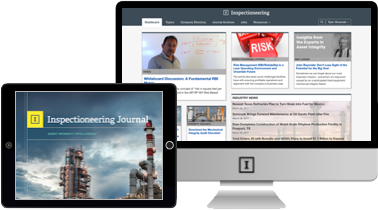Organizations in the technical inspection and engineering service industry dedicate significant time and effort to training and developing the next generation of professionals. Manuals, procedures, standards and guidelines are developed and published to provide necessary reference materials. Training classes and certifications are conducted to document competency and proficiency. Yet, much of the institutional knowledge gained by experience can only be found in the minds of experienced personnel. Today, savvy companies devote significant time and effort to ensuring that institutional knowledge is transferred from its senior engineers to its next generation of engineers and technicians, thereby benefitting the company itself and the industry as a whole. Recently, Inspectioneering Journal (IJ) sat down with Stress Engineering’s Bobby Wright and Ralph King to discuss how companies can better transfer and preserve industry knowledge.
How important is it for companies to develop a comprehensive strategy to recruit and develop the next generation of engineers and technical workers?
Mr. King: First, it’s important to recognize that we are in a sea-change within our industry. The demographics are changing, and we have additional technical requirements and expectations of growth across the refining and petro-chemical industry worldwide. Literally, within the next five to ten years, a whole generation of workers is going to turn over. The success that we’ve seen through managing high feedstock costs and controlling fixed costs is not going to be the skill set that will make companies successful in the future. We must be proactive in making that knowledge transfer happen and learn new strategies to take advantage of the next generation to maintain and improve plant safety and reliability.
Mr. Wright: Our clients and service companies are facing the same demographic change, and there are two major issues to consider: the first is the 50+ year-old generation that will be retiring and the second is the inexperience of the young engineers just coming out of school. We face these challenges at Stress Engineering Services and know our clients are facing them as well. During my 34 years in this industry, I know that in the earlier years there was a regimented format for transferring institutional knowledge and experience from senior engineers to junior engineers. But it seems like you rarely see that anymore. Now, when people retire, they may or may not have passed along what they know to younger engineers. As a consulting engineering company, we have to do that, because that’s our core business. Our clients contract with us because they expect us to know as much as they do, and more. We have a lot of experience from working with a variety of industries, and we deliberately seek out and hire experienced people as well as engineers right out of school. These issues are across the board in the engineering companies and in the oil and gas owner-operators, which are our primary clients, among others.


















Comments and Discussion
There are no comments yet.
Add a Comment
Please log in or register to participate in comments and discussions.